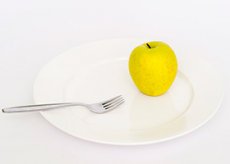Medical expert of the article
New publications
The quality of weight loss is very dependent on portion size
Last reviewed: 02.07.2025

All iLive content is medically reviewed or fact checked to ensure as much factual accuracy as possible.
We have strict sourcing guidelines and only link to reputable media sites, academic research institutions and, whenever possible, medically peer reviewed studies. Note that the numbers in parentheses ([1], [2], etc.) are clickable links to these studies.
If you feel that any of our content is inaccurate, out-of-date, or otherwise questionable, please select it and press Ctrl + Enter.

People who want to lose weight first of all pay attention to the choice of diet: there are diets that are effective, and there are not so much. However, few people know that the key role in losing weight is played not so much by what exactly we eat, but by the amount of food we eat. What is better - to eat a lot, but rarely, or a little, but often?
American physiologists from the University of Pennsylvania tried to answer this question. They decided to track how portion size and energy value of food affect the effectiveness of getting rid of extra pounds.
The experts offered two groups of women to take part in the experiment. Among them were 34 women suffering from high weight and obesity, and 39 participants with relatively successful previous experience of losing weight. In addition, the specialists formed a third group consisting of 29 women who did not have problems with excess weight. All groups of participants underwent weekly monitoring in the laboratory for a month. Each week they were offered the same products: changes concerned only the portion size and energy value of the diet (changes were distributed randomly).
Once a week, the women's diet changed: high-calorie products were replaced by low-calorie ones, and vice versa. Each participant was required to report how much food she ate during the week.
Experts found that if the subjects ate large amounts of low-calorie food, they wanted to eat more later, and their total daily calorie intake increased by 27%.
The most restrained in eating were the participants from the experienced dieters group, who had previously managed to successfully lose weight.
The unpleasant fact was that the entire food week depended on the portion size. That is, women who ate large portions continued to eat more food, but with a higher energy value.
One of the leaders of the experiment, nutritionist Barbara Rolls, claims that controlling the portion size is always more successful and easier than "sitting" on strict diets. In order to establish the required size of a single portion, the nutritionist recommends using the "fist" method: thus, a breakfast or dinner plate should include a volume of food equal to three of your own fists, and a lunch plate - four fists.
At the same time, do not forget that the daily diet should consist of protein products, vegetables, greens, mushrooms, complex carbohydrate foods and fruits. It is better to eat plant foods raw or with minimal heat treatment. A competent combination of the listed products will allow a person to easily and without harm to his health control his body weight.
The results of the research work were published on the pages of Appetite.

